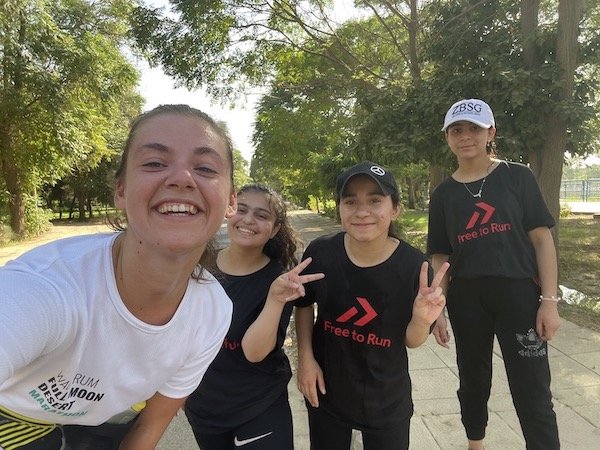Being Free to Run
Part 1: Introduction
“Sport is just the beginning” were the words emblazoned across every sporting venue in Birmingham, as the city played host to the 2022 Commonwealth Games. The words that I was constantly confronted with back at home in the United Kingdom after spending a month in Iraq as an intern with Free to Run. My job was to support the program officer with running with the girls each morning, or with other outdoor activities such as cycling and hiking. I also organized a 6km relay race which gave the girls from Kasnazan (Syrian refugees living in Iraq) an opportunity to meet those living in Baharka Camp and Harsham Camp (internally displaced people). The month was both challenging and energizing, but ultimately one which galvazanized me to think that running, a sport which is so often solitary, can actually be the basis of an incredibly important social movement.
There’s nothing new to the idea that sport can change lives both on and off the track and it is this very belief that prompted our founder, Stephanie Case, to bring Free to Run to life. However, the power of sport can often be deemed a cliché. It’s why we need a ‘moment’ to remind us how sport can change societal conversations and change a life. These moments can take place on the big sporting stage, such as the momentum that I arrived into, whereby England’s Lionesses win at the UEFA Women’s Euro 2022 final, had created a stir to simply #LetGirlsPlay. Provoking new conversations with the UK’s Department of Education about if boys play football at school, then the same must be offered to girls. Or, these moments can be more simple.
It was the simplicity (and yet power) of the very words ‘Free to Run’ which prompted me to ask the question - what does it mean to be free to run? Over a series of posts, we will be sharing what the words ‘Free to Run’ mean for some of the girls and young women in our programs and why they continue to rise at the crack of dawn to join us on runs around their camp, park or city.
Running is often hailed as a sport accessible to all due to it being seen as one of the few sports in which you can do virtually anywhere. And yet, an activity which seems so easy, and free for all is not. It continues to be an activity which highlights privilege and inequality. It’s why every runner needs a ‘moment’ to be reminded of the power of our sport. My ‘moment’ was triggered by the very act of running. It was 10:45 pm and I had gone to Sami Abdulrahman Park in Erbil, Iraq in an attempt to avoid the high temperatures. However, as the park’s information board flashed 38℃, I realized any attempt to have a ‘cool’ run in the peak of summer was going to fail. As I started following the track around the park, I could not stop thinking about the very words ‘Free to Run’.
The words made me reflect on my very experience of being free to run so late at night, as a young woman, in a park, in Iraq.
I make that distinction about being a young woman in Sami Park because although I’d love to say only temperature posed a problem, a challenge still remains on being a woman running in the city. Traditions and cultural norms continue to prevent women and girls from participating in outdoor activities, and so being a lone young woman in the park that night did fire me up with a slight anger, that globally we have so much work to do!
For me, being free to run, means being able to have the space to go into the void Japanese author Murakami describes: “All I do is keep on running in my own cozy, homemade void, my own nostalgic silence. And this is a pretty wonderful thing. No matter what anybody else says.”. It is only running, which gives me the clarity in which I can think about who I am and what I want, and in those times where injury or weather prevents a run, I do feel trapped, not only physically but mentally. So on reflection, I realized that being free to run is more than about running, it is in a sense symbolism - creating the space to be free - to think and be.
Yet, the very fact of Free to Run’s existence does bring to light that still, there are many women who are not free to run or as a result, make choices about things that affect their lives. This is about being more than free to run, this is about women having freedom to control their own lives globally. Globally, is important here, because although this mini-series will focus on what running means to our Iraq Free to Run community, the issue of girls and women not having freedom to control their own lives is not specific to one country or culture.
However, if we can continue to gather, encourage and support more women to be recognised as being free to run, then hopefully we can raise visibility that women should be free to be wherever they want to be.
Being Free to Run is a four-part series written by 2022 Iraq Intern/Running Coach, Eleri Connick

